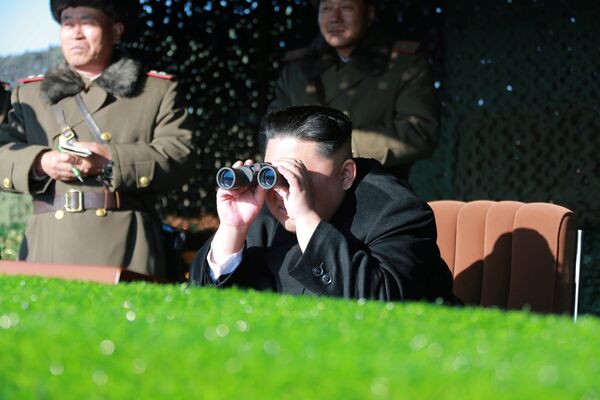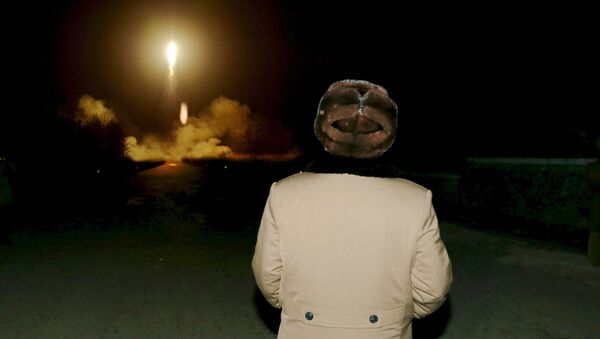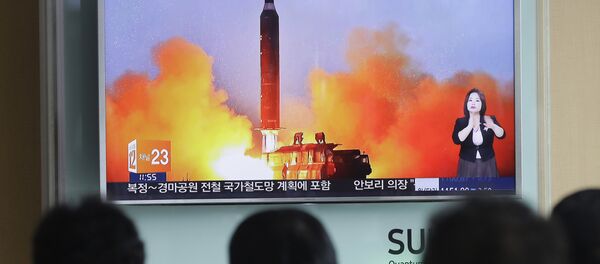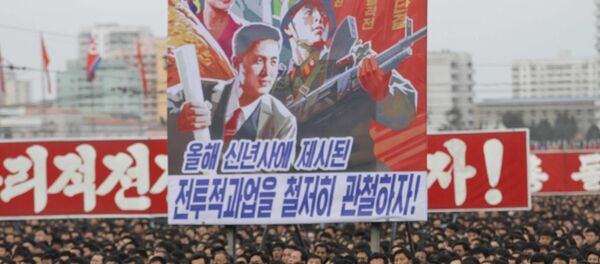US Secretary of Defense Ashton Carter highlighted Sunday that North Korea's nuclear weapons capabilities pose a "serious threat" to the United States, and with good reason, according to Russian historian and political analyst Dmitry Verkhoturov.
"Their nuclear weapons and ballistic missile defense programs are a serious threat to us," Carter said during his appearance on NBC's "Meet the Press" show.
"We only would shoot them down, and that is use an interceptive for that purpose, if it was threatening. That is, if it were coming toward our territory or the territory of our friends and allies," the Secretary of Defense specified, adding that Washington has already deployed missile defenses in South Korea, Japan and Guam to tackle the problem.
Speaking to Sputnik Korean, Verkhoturov assumed that Pyongyang is already in possession of intercontinental ballistic missiles (ICBMs) capable of reaching the territory of the US.
Furthermore, according to the political analyst, South Korea's Terminal High Altitude Area Defense (THAAD) system will hardly be able to intercept Pyongyang's ICBMs due to the fact that their trajectory will lie over the Arctic Ocean — beyond the reach of the anti-ballistic missile (ABM) system.
Verkhoturov drew attention to a statement made by Thae Yong-ho, a high-profile North Korean defector, on Sunday.
"North Korea has set the goal of developing miniaturized nuclear weapons that can fit atop a missile capable of reaching the US by the end of 2017 or early 2018 as it takes into account political transitions in South Korea and the US," Thae told Yonhap News Agency.
"A few years ago this statement would have been regarded as fictional, given the fact that North Korea was not in a position to carry out such works. However, after a series of North Korea's missile and nuclear tests even the most skeptical experts clammed up. The DPRK [the Democratic People's Republic of Korea] is rapidly bolstering its technological capabilities," Verkhoturov told Sputnik Korea.
The Russian analyst cited North Korean leader Kim Jong-un, who claimed in his New Year address that the DPRK had almost finished developing a long-range nuclear missile.

On September 5, 2016 North Korea launched three ballistic missiles in the direction of the Sea of Japan. Following the missile tests Pyongyang had reportedly carried out a successful test of a nuclear warhead, which is believed to be the largest blast since the country's nuclear program began.
"Back in 2013 it became clear that the DPRK had a flying prototype of an intercontinental ballistic missile, which was tested before the eyes of the entire world. We are speaking of the Unha-3 (Milky Way-3) rocket, which successfully launched the first North Korean satellite [Kwangmyongsong-3] on December 12, 2012," Verkhoturov said.
The Russian political analyst suggested that the Unha-3 is capable of delivering a nuclear warhead to the territory of the United States.
"With its length of 30 meters and the weight of 91 tons, the rocket could be compared with Cold War-era ballistic missiles," Verkhoturov noted, adding that "the Soviet UR-100 [ICBM] (SS-11) which had the length of 16.7 meters and the weight of 42,3 tons could deliver a 1,5-ton payload to the distance of 11 thousand kilometers."
Given this, one may assume that the DPRK's ICBMs were capable of reaching the territory of the United States even in 2013, the analyst remarked.
"That means that in response to any hostile act against the DPRK the United States could face a nuclear attack [from North Korea]," Verkhoturov suggested, adding that "the THAAD system in South Korea will hardly be able to intercept these missiles since their trajectory lies beyond the ABM's intercept zone — over Russia and the Arctic Ocean."
Meanwhile, the North Korean Foreign Ministry spokesperson declared Sunday that "the ICBM will be [test]-launched anytime and anywhere determined by the supreme headquarters of the DPRK."
"The US is wholly to blame for pushing the DPRK to have developed ICBM as it has desperately resorted to anachronistic policy hostile toward the DPRK for decades to encroach upon its sovereignty and vital rights," the spokesperson said as quoted by the official KCNA news agency.
Commenting on Kim Jong-un's New Year address, US President-elect Donald Trump tweeted: "North Korea just stated that it is in the final stages of developing a nuclear weapon capable of reaching parts of the US. It won't happen!"
North Korea just stated that it is in the final stages of developing a nuclear weapon capable of reaching parts of the U.S. It won't happen!
— Donald J. Trump (@realDonaldTrump) 2 января 2017 г.




